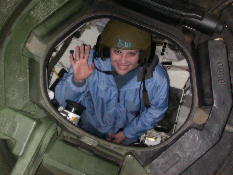December 04, 2004
Yes, I am guilty of dismissing academics...and I'm one of them. When the professor who is teaching Writing for Business proclaims himself a communist and the sociology prof keeps raving about Dude, Where's My Country?, well, it's easy to dismiss them. I have started looking skeptically at all professors, especially when they're writing articles like the one that drove me insane last spring. They don't all deserve to be dismissed, but far too many of them bring their personal agendas into the classroom. Heck, that's what made me start blogging in the first place.
Bunker talks about how none of his students could ever tell what side of the issues he stood on. I wrote about this over a year ago, and I'm just going to re-say the same thing here.
***
At Joanne Jacobs, we find a link to the Chicago Tribune article about critical thinking in a high school classroom:
The topic of class discussion was "Iraqification"--a term associated with the transfer of responsibility for Iraq's security from American soldiers to the Iraqi people -- and the students did not lack opinions on the subject.
Leading the Advanced Placement World History lab at Noble Street Charter High School in Chicago, teacher Joe Tenbusch asked his students at what time during the Iraq conflict more people have been killed.
"After we won," said Victoria Janik, 16, with a smirk, bringing nods and smiles of agreement from her peers, who had been pondering President Bush's possible motives for favoring Iraqification.
While some educators might find the exchange valuable--or, at worst, harmless--an outspoken group of social studies teachers around the country say such classroom scenes breed cynical, anti-American attitudes.
High school students, they argue, simply are not mature enough to engage in critical thinking. Teachers should focus on imparting a solid knowledge of history, economics, American traditions and government--in short, the ideals and values of a free society.
Joanne points out that there's no dichotomy here (you don't either teach thinking or facts); there's instead a relationship between how much you know about a topic and how well you can critically think about it. She adds,
In this case, the student is right in thinking that U.S. casualties (not "people") are a factor in the desire to give more authority to Iraqis. The question is whether she knows other facts. How many people did Saddam Hussein kill, directly and indirectly? How did the Occupation go in Germany and Japan after World War II? How did South Korea become a democracy?
Her commenters begin a discussion of the capability of teachers to actually teach critical thinking. Reader Tom West aptly points out,
Possibly, just possibly, teachers have a wide range of opinions like the rest of the humanity. Some support the current government, some support the last, some support both, and some support neither. Teachers are not a monolithic lot. To teach critical thinking requires that you be able to explain both sides of an issue, even when you don't subscribe to both sides.
I can think of one instance when I tried to do this and did it well. I was actually quite proud of myself. I was teaching ESL at the University of Illinois, and we were doing a unit on persuasive writing. Since one of the major issues on campus is the Native American mascot there, I decided that this would be a topic that they should understand since they were students at the university but that the students (who mostly came from Korea and South America) wouldn't already have an opinion on. And since I had been heavily involved in the debate on campus and had read the entire Chief Illiniwek Dialogue Report to the Board of Trustees, I knew both sides of the issue like the back of my hand. I told my students that I indeed heartily supported one side of the issue, but that I would not tell them which side I supported, and that they were going to learn about both sides. We read the whole Dialogue, watched a video tape, reported on the protestors carrying picket signs through campus, and had a two-hour discussion where they asked me questions about what people on the campus believed. We covered both sides; for every question they asked, I reported what the pro-Chief and the anti-Chief people would reply. After our information gathering, the students wrote their persuasive papers on the stance they had developed (whether the Chief Illiniwek mascot should be retained or retired) and turned them in. The next class period we had an in-class writing assignment where the students had to write a one page paper saying whether they thought that I personally supported the Chief or not. The result? Half of the class guessed I did, and the other half guessed I didn't. And I never told them which side I was on.
The reason this worked is because I was determined to let these students decide for themselves. It didn't matter to me which side they chose, as long as they read about the issue and formed logical and informed opinions. And I didn't want them to cop out and write the "easy" paper, the one that agreed with the teacher. We spent an equal amount of time on both sides, but the dicipline had to be mine. I was the one who did the most work, having to argue for both sides equally as passionately and equally as strong. I had to be impartial, I had to keep secret my involvement in the debate, and I had to let the students learn, even if what they were learning disagreed with my opinion. I don't think most teachers are willing to do this. It's easier to be like Professor Cockroach and talk off the cuff about one's own opinions and side of the story. It's much harder to give a reasoned debate for both sides, and many teachers don't care enough about their students to want them to learn how to learn. They just want them to regurgitate. I think it's a real problem in education, and I think we're doing a real disservice to our students. Heck, I didn't learn how to learn until I started reading blogs and writing my own. Can we make blogging a school subject?
***
(back to 2004) It's much harder for me to do this with the war. It's difficult for me to argue for both sides, so I just don't do it. I don't talk war in the classroom. Sometimes my students try to get going, and I let them go back and forth together, but I never chime in. They're also not allowed to write any of their papers about the war because 1) they're not allowed to ignore any Army Values in my class, 2) I have read far too much about the war to ever concede that they will have done enough research, and 3) I know cannot objectively read a paper that's anti-war. And since I don't want to introduce anything into the class that's not objective, both my view and theirs are off limits. I can, and do, objectively read papers on many things that I disagree with, but the war is too close to my heart for that.
Universities these days just don't seem to have enough honest debate from both sides. I took a class once on Malcolm X, and any time someone said something even remotely unfavorable about Malcolm X, the black students immediately got angry. My roommate took a class where the teacher gave her an F on a paper because "you know I don't agree with your viewpoint, so why would you think of writing on this topic?" I once taught a class where, heaven forbid, I used the argument that hate speech should be protected under the First Amendment as a sample argument for a persuasive paper, and a Korean student went to our director and turned me in as a racist.
Sigh.
Posted by: Sarah at
05:11 AM
| Comments (2)
| Add Comment
Post contains 1388 words, total size 8 kb.
Posted by: Toni at December 04, 2004 09:14 AM (X4nZO)
Posted by: Mike at December 04, 2004 05:00 PM (b7AUG)
48 queries taking 0.1182 seconds, 169 records returned.
Powered by Minx 1.1.6c-pink.














